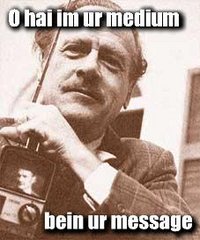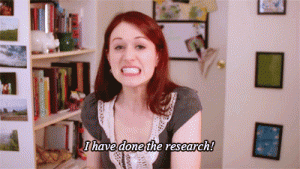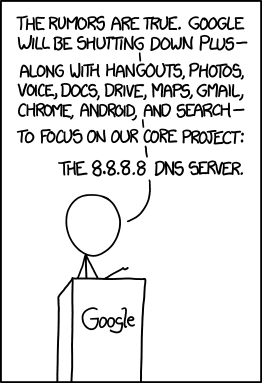
Marshall McLuhan’s writing in Understanding Media came off extremely dense and complex for me to comprehend, other than the obvious: “the medium is the message.” I mean, I understood that it was revolutionary, but I couldn’t quite grasp what McLuhan was getting at. But then, I though about mediums that I use and what messages they might be trying to convey. And then it clicked: as someone who has followed several transmedia productions, McLuhan’s concepts seemed all the more pressing. Which makes me wonder: what would McLuhan think of our media (and the way we understand it) today?
[youtube]http://youtu.be/KisuGP2lcPs[/youtube]
For example, what would McLuhan think of Pemberley Digital’s The Lizzie Bennet Diaries (hereafter referred to as LBD), which portrayed Jane Austen’s Elizabeth Bennet as a 21st-century grad student moving back home to figure out her future? Instead of just the printed word, LBD used a number of mediums and accounts to tell the story – namely Twitter, Tumblr, and YouTube. Viewers could pick and choose which mediums to follow the narrative on (though YouTube was the most popular choice.) To interact with the story, viewers could migrate from platform or medium, from character to character. LBD is not the only transmedia production entertaining the idea of an immersive and interactive experience for an audience (literary vlogseries are all the rage now) but it was the first to attract attention for doing so. (It won an Emmy in 2013 for “Outstanding Creative Achievement in Interactive Media-Original Interactive Program.”)
Whether intended by the creators or not, McLuhan’s idea of “the medium is the message” here is central to the experience of watching LBD. Viewers were encouraged to interact with the characters as people, to be a part of this fictional world turned reality. The transmedia production requires an investment on the viewer’s part to stay involved, making the fictional a part of their everyday life. And by using these mediums – platforms designed for personal use – fans could connect with the characters in a way I believe McLuhan would probably find fascinating.
In his 1977 lecture for the Monday Conference that we watched for class, McLuhan talked about the hologram being the ultimate medium, because it would envelop the viewer’s physical presence. But McLuhan lived and studied an age before the advent of new media; his world didn’t have the smartphone or the apps we use on a daily (or if you’re like me, hourly) basis. While a hologram consumes the physical environment, transmedia productions manipulate and dominate the digital one. Lizzie’s Twitter feed reads much like our own, and so we experience her story in a similar way. Her Tumblr reblogged and shared posts from other users. Her YouTube videos broke the fourth wall because there isn’t a fourth wall anymore.
It’s a whole new media landscape we’re inhabiting here – and transmedia productions take advantage of that to play out these literary classics. McLuhan would be thrilled to see how pervasive today’s mediums are with their messages. But perhaps it’s this layering effect will display the greatest medium message of all. The more we interact with new media, the more the lines between reality and fiction become blurry.















 New media can counter monopolies and bring down corporations. But as we’ve seen, new media is a fertile ground for new companies and corporations, both of which could be just as bad, or worse, than their predecessors. Google is scary. At all times. It’s a bit like the supervolcano under Yellowstone National Park. We know that someday it will blow and change the world as we know it. We just don’t know when. It could be today. It could be tomorrow.
New media can counter monopolies and bring down corporations. But as we’ve seen, new media is a fertile ground for new companies and corporations, both of which could be just as bad, or worse, than their predecessors. Google is scary. At all times. It’s a bit like the supervolcano under Yellowstone National Park. We know that someday it will blow and change the world as we know it. We just don’t know when. It could be today. It could be tomorrow.


